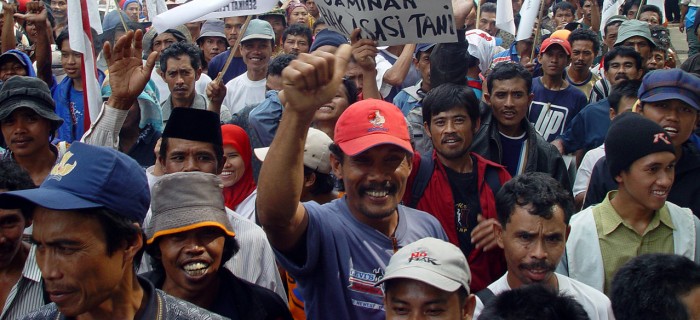Critical Perspectives on Food Sovereignty
In The Journal of Peasant Studies, Volume 41, Issue 6, 2014. DOI:10.1080/03066150.2014.963568
Abstract
Visions of food sovereignty have been extremely important in helping to galvanize broad-based and diverse movements around the need for radical changes in agro-food systems. Yet while food sovereignty has thrived as a ‘dynamic process’, until recently there has been insufficient attention to many thorny questions, such as its origins, its connection to other food justice movements, its relation to rights discourses, the roles of markets and states and the challenges of implementation. This essay contributes to food sovereignty praxis by pushing the process of critical self-reflection forward and considering its relation to critical agrarian studies – and vice versa.
KEYWORDS food sovereignty, social movements, critical agrarian studies, food security, agricultural trade, agroecology
Over the course of more than two decades, visions of ‘food sovereignty’ have inspired (and been inspired by) a wellspring of social movements, on-the-ground experiments, policy innovations and – increasingly – heated debates. Even though proponents insist that food sovereignty is a ‘dynamic process’ rather than a set of fixed principles, until recently there had been little sustained interest in grappling with thorny questions of its origins, what its practical and conceptual limitations might be and what it would take to implement it now and in the future in economically, politically and ecologically diverse contexts. That reticence was perhaps rooted in the adoption of food sovereignty by transnational agrarian movements, such as La Vía Campesina (LVC), and the foot-dragging of sympathetic activists and researchers who were disinclined to challenge organizations representing peasants and leading figures within them.
Two conferences – at Yale University in New Haven in September 2013 and at the International Institute of Social Studies (ISS) in The Hague in January 2014 – widened and deepened growing debates.1 Questions that scholar-activists had raised in off-the-record interviews with food sovereignty advocates and peasant leaders, or in hushed conversations in university corridors, exploded in fiery polemics – and received in-depth analytical attention in some 90 papers, 15 of which are represented in this collection.2 The active participation of numerous food sovereignty and peasant activists at these events and in authoring many of the papers made these much more than typical, run-of-the-mill academic conferences. What began as a dialogue in which academics asked ‘Does food sovereignty have a future in critical agrarian studies?’ was playfully flipped the other way by practitioners to ask ‘Do critical agrarian studies have a future in food sovereignty?’ Indeed, though diverse ideological standpoints led to some intense debates, a striking feature of these ‘critical dialogues’ was the enthusiasm that participants of every provenance and professional position displayed for engaging with each other’s ideas in an atmosphere of mutual respect and appreciation. Readers of this collection will find that food sovereignty is a dynamic process after all, and one that increasingly intensifies its praxis and includes a much more profound process of self-reflection and a broad interrogation of key premises and heretofore unexamined assumptions.
Much of the early literature on food sovereignty involved a considerable dose of idealistic righteousness – and rightfully so, since the concept had contributed beyond anybody’s initial expectations to galvanizing a broad-based and diverse movement around the need for radical changes in agro-food systems. Self-congratulatory celebrations of food sovereignty, however, too often went hand-in-hand with a certain inattention to underlying premises, policy implications and even the history of the idea itself. The critical dialogue in the pages below cranks up the intensity of the debates, leaving behind this oddly complacent past practice and raising difficult questions – including some for which there may be no immediate answers. While unable to capture the full breadth of the growing debate on the significance of food sovereignty as a mobilizing frame, policy objective and plan of action, this collection seeks to put academics, activists and of course activist-academics on a more solid footing as they engage and work with both agrarian studies and social movements struggling towards food sovereignty.
Stay in the loop with Food First!
Get our independent analysis, research, and other publications you care about to your inbox for free!
Sign up today!For free access to the full article, please visit Taylor Francis Online.


 Help Food First to continue growing an informed, transformative, and flourishing food movement.
Help Food First to continue growing an informed, transformative, and flourishing food movement.




